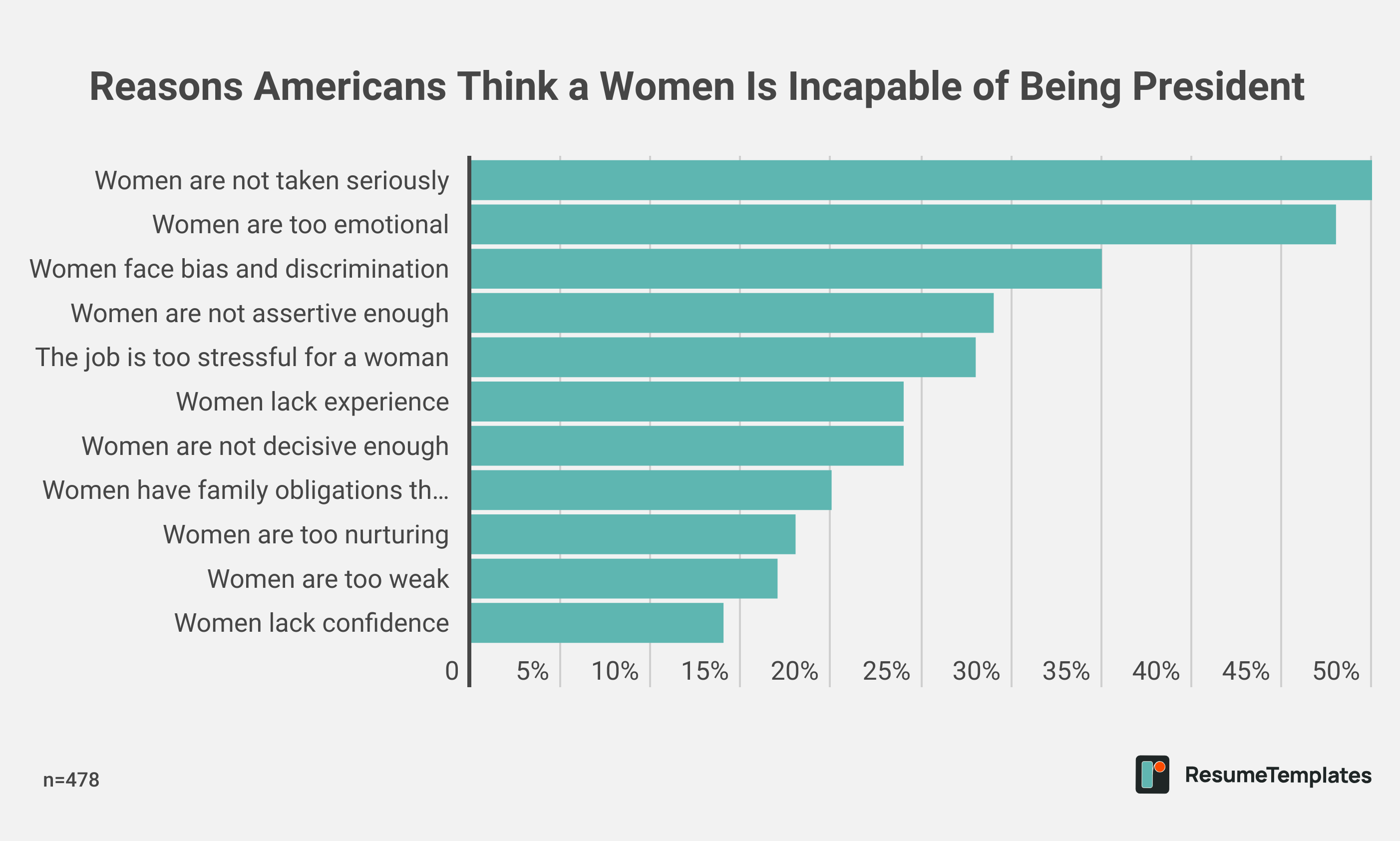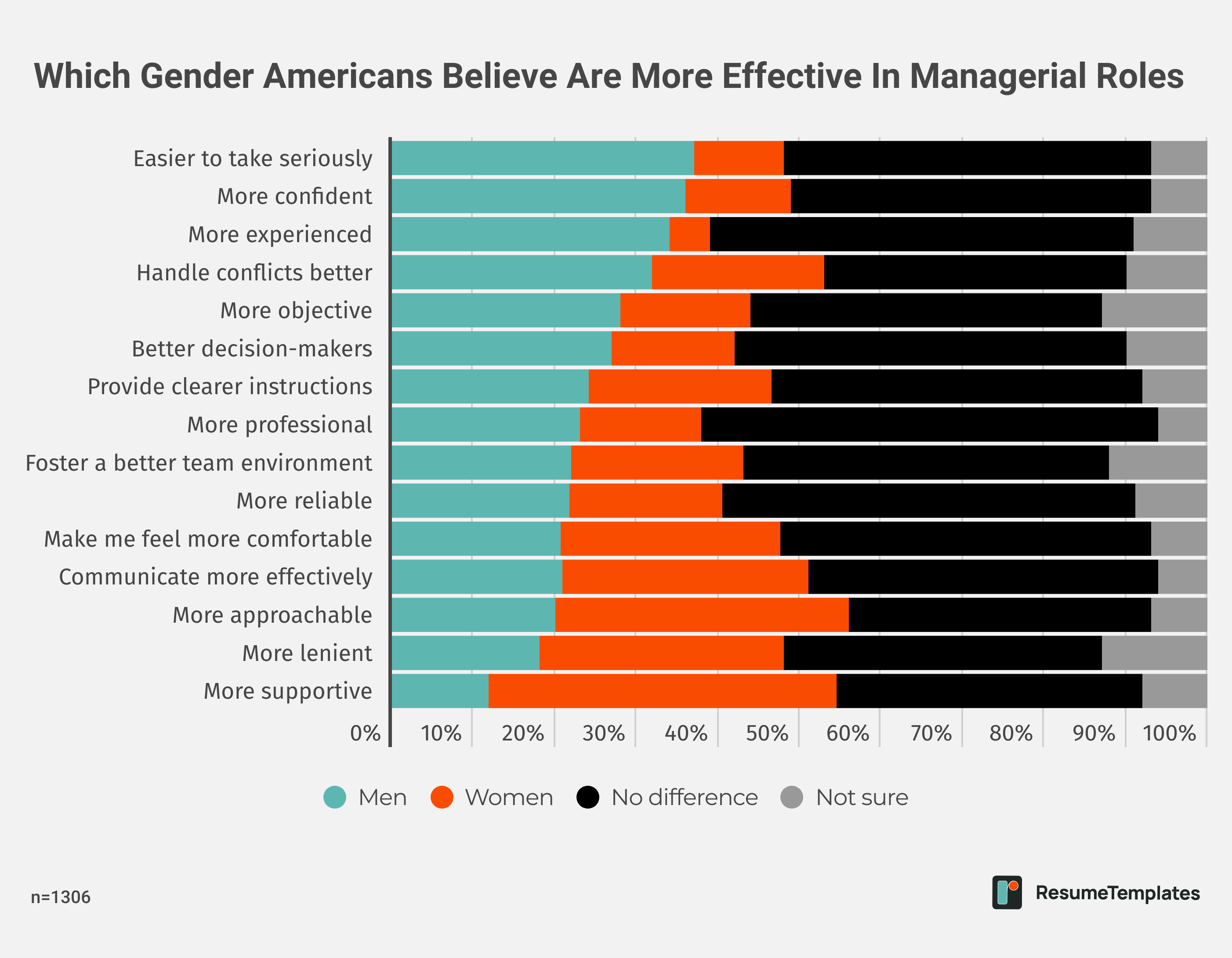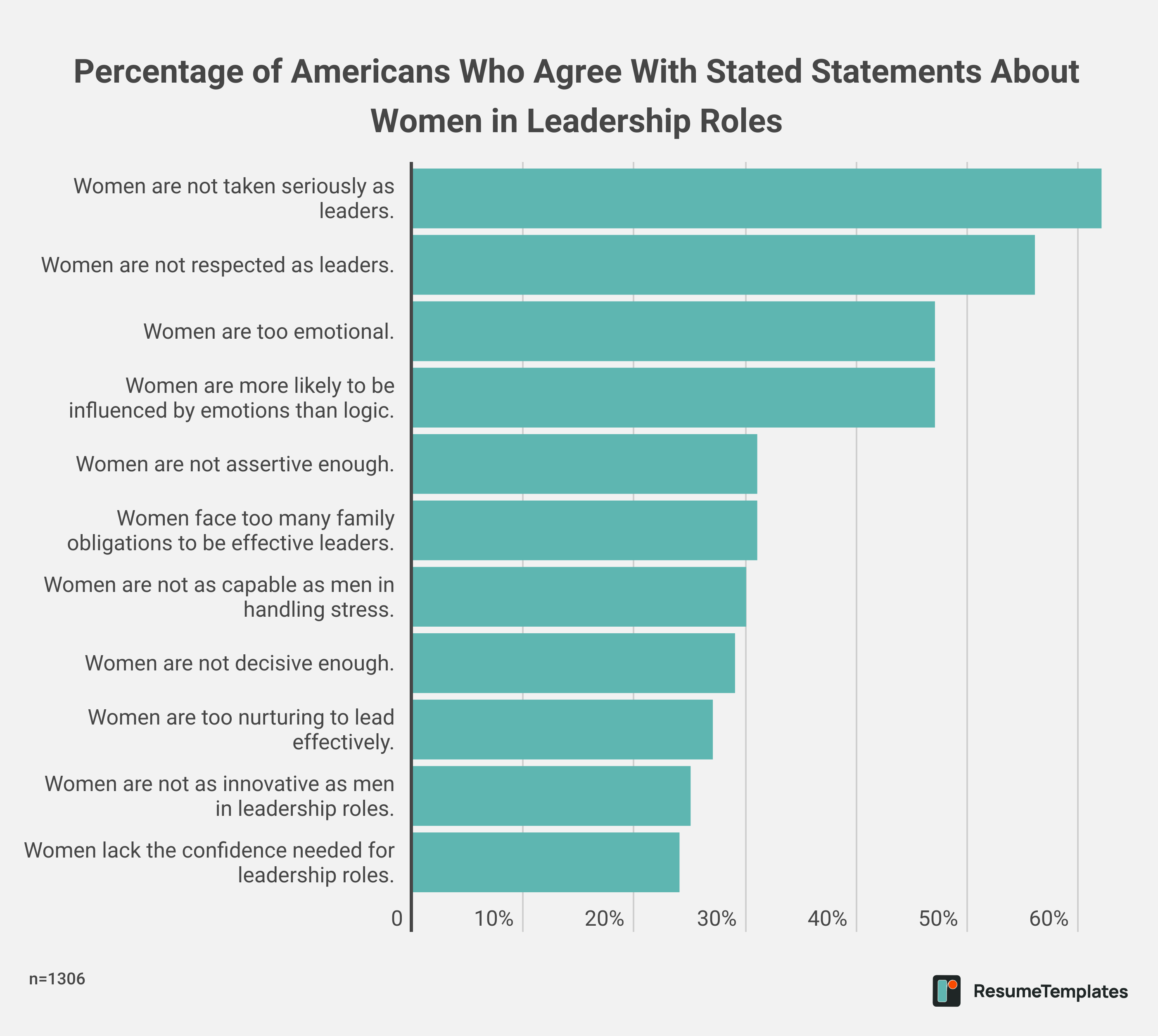With Vice President Kamala Harris as the likely Democratic presidential nominee, ResumeTemplates.com surveyed 1,306 U.S.adults last week to ask about their perceptions of women in leadership.
The survey revealed insights into the ongoing gender biases present in U.S. politics and workplaces.
Study highlights:
- 16% of Americans surveyed don’t think a woman is capable of being president of the U.S.
- Most cited reasons are the belief that women are not taken as seriously and that they’re too emotional
- 4 in 10 Americans who are unlikely to vote for Harris say her gender plays a role in their decision
- 39% of respondents say men are more effective leaders than women
- Respondents believe men are more confident, better decision-makers, handle conflict better, and are more professional than women
1 in 6 Americans Don’t Think a Woman Is Capable of Being President
When asked about the capability of a woman being president of the U.S., 62% of U.S. citizens say that women are either extremely (22%) or very capable (40%), while 22% believe women are only moderately capable. In contrast, 15% think women are not very (10%) or not at all capable (5%) of being president.
“While there are people who still believe women aren’t fit for leadership, there are significantly more who do. Had this poll been conducted 30 years ago, I think the results would have been very different. We need to acknowledge that times are changing and people’s perceptions are changing in a positive way,” says ResumeTemplates.com’s Chief Career Strategist Julia Toothacre.
Women are too emotional, not taken seriously enough to be president
The top reasons for believing a woman would not be capable of being president are that women are not taken seriously (50%), are too emotional (48%), face bias and discrimination (35%), are not assertive enough (29%), and the job is too stressful for a woman (28%).
Women are more likely to say women aren’t taken seriously enough to be president (57%), while men are more likely to say women are too emotional (55%).
“Given that there are countries around the world that don’t value women, I can see why some Americans feel a female president wouldn’t be taken seriously as a man. But too emotional? I’d argue that women are in more control of their emotions than most men, especially high-profile women. While women have more biological highs and lows than men do, we’ve spent our lives managing ourselves and others,” says Toothacre.

1 in 3 say Harris’s gender is a factor in their decision not to vote for her
Of voters who are unlikely to cast their vote for Harris, 38% say her gender plays a role in their decision. A total of 8% see Harris’s gender as a significant factor in their likelihood of not voting for her, while 12% view it as a moderate factor, and 17% say it’s a minor factor. In contrast, 62% indicate that Harris’s gender is not a factor at all in their decision to not vote for her.
4 in 10 Americans Feel Men Are More Effective in Leadership Roles Than Women
While 51% of respondents believe there is no difference in leadership effectiveness between men and women, 20% think men are much more effective than women, and 19% think men are a little more effective. In contrast, 4% think women are much more effective than men, and 6% think women are a little more effective.
“Studies have shown that female CEOs outperform male CEOs and are considered less risky. One might even say that less risk could correlate with better emotional control. Less risk might also correlate with making more data-driven and rational decisions, not emotional ones,” says Toothacre.
Similarly, while 53% of Americans have no preference for being managed by men or women in the workplace, 28% prefer men (11% strongly, 16% somewhat), while 16% prefer women (10% somewhat, 6% strongly).
Men are viewed as more serious, experienced, and confident
Men are more likely than women to be seen as easier to take seriously (37% vs. 11% respectively), experienced (34% vs. 5%), confident (36% vs. 13%), better at handling conflicts (32% vs. 21%), objective (28% vs. 16%), and professional (23% vs. 15%). They are also more likely to be viewed as capable of providing clearer instructions (24% vs. 22%) and reliable (22% vs. 19%).
Women, on the other hand, are more likely than men to be seen as supportive (43% vs. 12%), better at communicating (30% vs. 21%), and approachable (36% vs. 20%).

Similarly, when asked to what extent they agree or disagree with statements about women in leadership roles, 62% of Americans agree that women are not taken seriously as leaders. And 56% believe women are not respected as leaders. Additionally, 47% think women are more likely to be influenced by emotions than logic, and 47% consider women too emotional. Furthermore, 39% agree that women lack the confidence needed for leadership roles, while 39% feel women are not as capable as men in handling stress.
Additionally, 33% agree that women are not decisive enough, 32% believe women face too many family obligations to be effective leaders, and 31% think women are not assertive enough. Moreover, 30% consider women too nurturing to lead effectively, 28% feel women are not innovative enough, and 24% think women do not inspire confidence in their teams.

Half of Americans Say Sexism in the Workplace Is a Problem
Regarding the extent of sexism in the workplace, 55% view it as a major (18%) or moderate (37%) problem. Additionally, 29% see it as a minor issue, and 11% believe it is not a problem at all.
According to the data, 68% of people in the U.S. think women face discrimination in leadership roles more often (52%) or much more frequently (16%) than men. And 19% believe the discrimination is about the same for both genders.
In terms of the importance of diversity in leadership for a company’s success, 47% consider it very (32%) or extremely (15%) important, 28% find it moderately important, and 20% see it as not very or not at all important.
“While we’ve come a long way, sexism is still an issue, and it impacts women climbing the corporate ladder to get to high-level roles. As generational priorities shift, I believe we’ll continue to see women enter and make an impact in leadership positions,” says Toothacre.
This survey was conducted on July 25, 2024. It surveyed 1,306 U.S. citizens, and it was census-balanced for age, gender, and region.
Resume Templates offers HR approved resume templates to help you create a professional resume in minutes. Choose from several template options and even pre-populate a resume from your profile.
